高中英语新课标外研版必修4教案 Period2 Vocabulary;Writing(Module7 Revison) (2)
外研 高中英语必修4Module 2writing(共30张PPT)
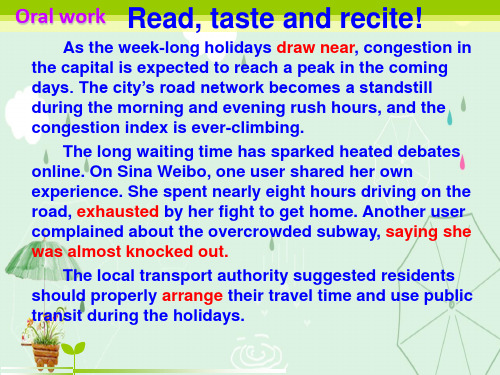
Oral work Read, taste and recite!
As the week-long holidays draw near, congestion in the capital is expected to reach a peak in the coming days. The city’s road network becomes a standstill during the morning and evening rush hours, and the congestion index is ever-climbing.
Let’s go green travelling. Let’s restore human legs as a means of travel Let’s take the responsibility to build up a low-carbon city. Come on and join us!
明朝未及,我只有过好每一个今天,唯一的今天。
昨日的明天是今天。明天的昨日是今天。为什么要计较于过去呢(先别急着纠正我的错误,你确实可以在评判过去中学到许多)。但是我发现有的人过分地瞻前顾后了。为 何不想想“现在”呢?为何不及时行乐呢?如果你的回答是“不”,那么是时候该重新考虑一下了。成功的最大障碍是惧怕失败。这些句子都教育我们:不要惧怕失败。如 果你失败了他不会坐下来说:“靠,我真失败,我放弃。”并且不是一个婴儿会如此做,他们都会反反复复,一次一次地尝试。如果一条路走不通,那就走走其他途径,不 断尝试。惧怕失败仅仅是社会导致的一种品质,没有人生来害怕失败,记住这一点。宁愿做事而犯错,也不要为了不犯错而什么都不做。不一定要等到时机完全成熟才动手。 开头也许艰难,但是随着时间的流逝,你会渐渐熟悉你的事业。世上往往没有完美的时机,所以当你觉得做某事还不是时候,先做起来再说吧。喜欢追梦的人,切记不要被 梦想主宰;善于谋划的人,切记空想达不到目标;拥有实干精神的人,切记选对方向比努力做事重要。太阳不会因为你的失意,明天不再升起;月亮不会因为你的抱怨,今 晚不再降落。蒙住自己的眼睛,不等于世界就漆黑一团;蒙住别人的眼睛,不等于光明就属于自己!鱼搅不浑大海,雾压不倒高山,雷声叫不倒山岗,扇子驱不散大雾。鹿 的脖子再长,总高不过它的脑袋。人的脚指头再长,也长不过他的脚板。人的行动再快也快不过思想!以前认为水不可能倒流,那是还没有找到发明抽水机的方法;现在认 为太阳不可能从西边出来,这是还没住到太阳从西边出来的星球上。这个世界只有想不到的,没有做不到的!不是井里没有水,而是挖的不够深;不是成功来的慢,而是放 弃速度快。得到一件东西需要智慧,放弃一样东西则需要勇气!终而复始,日月是也。死而复生,四时是也。奇正相生,循环无端,涨跌相生,循环无端,涨跌相生,循环 无穷。机遇孕育着挑战,挑战中孕育着机遇,这是千古验证了的定律!种子放在水泥地板上会被晒死,种子放在水里会被淹死,种子放到肥沃的土壤里就生根发芽结果。选
高中英语新课标外研版必修4教案 Period4 Writing Everyday EnglishMo

Period 4Writing;Everyday EnglishThe General Idea of This PeriodActivity 1 is a preparation of writing.The students may be encouraged to read the passage to learn about how to make predictions.Through this activity the students can master some ways to tell about the future things and some words as well.In writing what they will be doing in ten years,the teacher may teach them the steps:first make an outline and write down some key words;the next step is to exchange their works with their deskmates for suggestions;the last step is correction.In Everyday English the teacher may first encourage the students to do this activity individually and then check with a partner.To consolidate it the teacher may ask the students to make up a dialogue using the phrases in this part.Teaching Important PointsTo motivate the students to work together.Teaching Difficult PointsHow to enable the students to write about the future things.Teaching MethodsInduction and practiceTeaching AidsA blackboard,a tape recorder and a multimediaThree Dimensional Teaching AimsKnowledge and SkillsTo let the students know how to make predictions.To train their writing skills.To train their speaking skills.Process and StrategiesEncourage the students to speak in class through organizing some practice.Teach the students to write following the steps.Feelings and ValueThrough the predictions of the future things make the students think about the trends of the future world's development.Teaching ProceduresStep 1 RevisionT:Good morning,class!Last period we have learned the future continuous.Today let's do some exercises to consolidate it.(Show the following on the screen.)Underline the best verb form.Example:Many jobs that exist today will/are going to disappear in the future.1.If we don't find another planet to live on,we are dying/will die.2.puters are running/will run everything in the house in the future.3.The plane leaves/will leave at ten o'clock.4.New medical technology improves/will improve our lives.5.In the year 2100,people are going to have/will be having holidays in space.Suggested answers:1.will die2.will run3.leaves4.will improve5.will be havingT:More exercises.(Show the following on the screen.)plete the sentences with the verbs in brackets in the most appropriate forms:the future simple,or the future continuousExample:By the year 2050,people will be traveling (travel) outside our solar system.1.I hope scientists __________(find) a cure for cancer.2.By the middle of this century,more people __________(live) in cities than in the country.3.Ten years from now,people __________(wear) smart clothes.4.No one __________ever __________(live) on Mars.5.Humans __________(live) on another planet five billion years from now.6.A Chinese astronaut__________(reach) Mars by 2050.Suggested answers:1.will find2.will be living3.will be wearing4.will,live5.will be living6.will reach Step 2 WritingT:So much for the check up.Before we begin to write first let's read a passage,which is about the predictions of the future.Please work in pairs and answer the following questions. (Show the following on the screen.)1.Which student:a.wants to work in a job that will help sick people?b.would like to live in a different country?c.hopes to have a family?d.doesn't have any future plans?2.Find words or phrases that mean:a.I don't know exactly I'm not really sureb.it's certain__________ __________c.I hope this will happen__________ __________d.it's possible__________ __________e.after a long time__________ __________3.What different ways of talking about the future can you find?(Give the students a few minutes to read the passage and then call back their answers.) Suggested answers:1.a-Ken b-Emma c-Mary d-Thomas2.a.I'm not really sure b-definitely d-maybe/probably e-eventually3.I will be doing/I will definitely study/I'm going to go/I guess that I willT:Now please write about what you will be doing in ten years in 100 words.You may follow the following steps:first make an outline and write down some key words;the next step is to exchange their works with their deskmates for suggestions;the last step is correction.The four paragraphs on Page 8 are good models,though they are all around 80 words long,rather than the 100 words the students are asked to write.Encourage the students to use:1.the future continuous tense(I'll be doing/I won't be doing)2.the introductory verbs:I hope/I guess/I imagine/I'd like to.3.the introductory words:hopefully/eventually/maybe/definitely.3 Everyday English StepT:That's all for our writing.Now let's e to our Everyday English. Please look at the words and phrases and choose the best explanation.(Show the following on the screen.)1.You get rid of something if you__________.A.need itB.don't need it2.If something is free of charge it__________.A.doesn't cost anythingB.is allowed by the law3.For a start means__________.A.at the beginningB.the first point is4.If you run out of something you__________.A.leave it quicklyB.haven't got any of it left5.If something is on the way out it's going to__________.A.disappearB.bee famous(Ask the students to do this exercise individually.)Suggested answers:1.B2.A3.B4.B5.AStep 4 Summary and homeworkT:Today first we read a passage to learn how to make predictions.And then we practicedwriting about predictions.Just remember to write notes before starting writing.In that way you won't get stuck after writing one sentence.When you have finished writing,read through what you have written.Make any changes which you think will make your writing clearer for the reader.In Everyday English,we learned some words and phrases and how to use them.After class please use the words or phrases we learned to make up your own dialogue.That's all for today.You are dismissed!The Design of the Writing on the BlackboardModule 1Life in the FutureThe fourth periodget rid of free of charge run out of on the way outRecord after Teaching______________________________________________________________________________________________________________________________________________________Activities and Research1.Ask the students to make up a dialogue using the phrases in Everyday English.2.Write a short paragraph to make predictions of the future.Reference for TeachingLanguage Points1.e true 实现;成为现实s like a dream ing true.'It这犹如梦想变成了现实。
外研 高中英语必修4Module2 writing (共17张PPT)
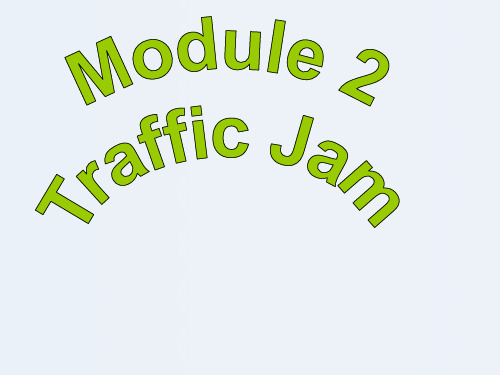
Show your writing
Better your composition according to the tips.
• Group1:the traffic problems in your city and the reasons for them
• Group2: Suppose y:ou are the mayor of your city, and what measure will you take to solve the traffic problems?
On the one hand, …; On the other hand,… 一方面,…;另一方面,…
The solutions to the phenomenon
In view of the seriousness of the phenomenon, effective measures should be taken as follows. 考虑到这一现象的严重性,必须采取如 下有效措施。
The effects of the phenomenon
The significant effects of this phenomenon are undeniable, which can be concluded as the following aspects.这 一现象的重大影响是不可忽略的,可大致归 结为以下几个方面:
Read the passage and answer the questions. 1. How many problems does the writer
talk about? Four (too many cars; terrible air; buses stuck; accidents with cyclists).
外研 高中英语必修4Module 2writing (共15张PPT)
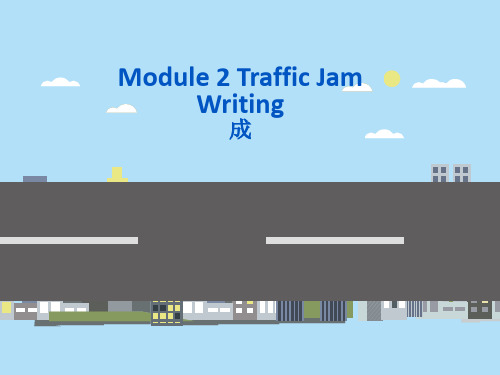
成
Get around in Beijing
Traffic Jams in Beijing
Pre-listening: Vocabulary Building
traffic lights 1.
flyover 3.
2. traffic signs
Writing: Causes &Possible Solutions
Cultural corner Corner pair discussion
Para. 2
Causes of traffic jams
Para. 3
Possible solutions
Para. 1
Present situation
1、只要有坚强的意志力,就自然而然地会有能耐、机灵和知识。2、你们应该培养对自己,对自己的力量的信心,百这种信心是靠克服障碍,培养意志和锻炼意志而获得的。 3、坚强的信念能赢得强者的心,并使他们变得更坚强。4、天行健,君子以自强不息。5、有百折不挠的信念的所支持的人的意志,比那些似乎是无敌的物质力量有更强大 的威力。6、永远没有人力可以击退一个坚决强毅的希望。7、意大利有一句谚语:对一个歌手的要求,首先是嗓子、嗓子和嗓子……我现在按照这一公式拙劣地摹仿为:对 一个要成为不负于高尔基所声称的那种“人”的要求,首先是意志、意志和意志。8、执着追求并从中得到最大快乐的人,才是成功者。9、三军可夺帅也,匹夫不可夺志也。 10、发现者,尤其是一个初出茅庐的年轻发现者,需要勇气才能无视他人的冷漠和怀疑,才能坚持自己发现的意志,并把研究继续下去。11、我的本质不是我的意志的结果, 相反,我的意志是我的本质的结果,因为我先有存在,后有意志,存在可以没有意志,但是没有存在就没有意志。12、公共的利益,人类的福利,可以使可憎的工作变为可 贵,只有开明人士才能知道克服困难所需要的热忱。13、立志用功如种树然,方其根芽,犹未有干;及其有干,尚未有枝;枝而后叶,叶而后花。14、意志的出现不是对愿 望的否定,而是把愿望合并和提升到一个更高的意识水平上。15、无论是美女的歌声,还是鬓狗的狂吠,无论是鳄鱼的眼泪,还是恶狼的嚎叫,都不会使我动摇。16、即使 遇到了不幸的灾难,已经开始了的事情决不放弃。17、最可怕的敌人,就是没有坚强的信念。18、既然我已经踏上这条道路,那么,任何东西都不应妨碍我沿着这条路走下 去。19、意志若是屈从,不论程度如何,它都帮助了暴力。20、有了坚定的意志,就等于给双脚添了一对翅膀。21、意志坚强,就会战胜恶运。22、只有刚强的人,才有神 圣的意志,凡是战斗的人,才能取得胜利。23、卓越的人的一大优点是:在不利和艰难的遭遇里百折不挠。24、疼痛的强度,同自然赋于人类的意志和刚度成正比。25、能 够岿然不动,坚持正见,度过难关的人是不多的。26、钢是在烈火和急剧冷却里锻炼出来的,所以才能坚硬和什么也不怕。我们的一代也是这样的在斗争中和可怕的考验中 锻炼出来的,学习了不在生活面前屈服。27、只要持续地努力,不懈地奋斗,就没有征服不了的东西。28、立志不坚,终不济事。29、功崇惟志,业广惟勤。30、一个崇高 的目标,只要不渝地追求,就会居为壮举;在它纯洁的目光里,一切美德必将胜利。31、书不记,熟读可记;义不精,细思可精;惟有志不立,直是无着力处。32、您得相 信,有志者事竟成。古人告诫说:“天国是努力进入的”。只有当勉为其难地一步步向它走去的时候,才必须勉为其难地一步步走下去,才必须勉为其难地去达到它。33、 告诉你使我达到目标的奥秘吧,我唯一的力量就是我的坚持精神。34、成大事不在于力量的大小,而在于能坚持多久。35、一个人所能做的就是做出好榜样,要有勇气在风 言风语的社会中坚定地高举伦理的信念。36、即使在把眼睛盯着大地的时候,那超群的目光仍然保持着凝视太阳的能力。37、你既然期望辉煌伟大的一生,那么就应该从今 天起,以毫不动摇的决心和坚定不移的信念,凭自己的智慧和毅力,去创造你和人类的快乐。38、一个有决心的人,将会找到他的道路。39、在希望与失望的决斗中,如果 你用勇气与坚决的双手紧握着,胜利必属于希望。40、富贵不能淫,贫贱不能移,威武不能屈。41、生活的道路一旦选定,就要勇敢地走到底,决不回头。42、生命里最重 要的事情是要有个远大的目标,并借助才能与坚持来完成它。43、事业常成于坚忍,毁于急躁。我在沙漠中曾亲眼看见,匆忙的旅人落在从容的后边;疾驰的骏马落在后头, 缓步的骆驼继续向前。44、有志者事竟成。45、穷且益坚,不坠青云之志。46、意志目标不在自然中存在,而在生命中蕴藏。47、坚持意志伟大的事业需要始终不渝的精神。 48、思想的形成,首先是意志的形成。49、谁有历经千辛万苦的意志,谁就能达到任何目的。50、不作什么决定的意志不是现实的意志;无性格的人从来不做出决定。我终 生的等待,换不来你刹那的凝眸。最美的不是下雨天,是曾与你躲过雨的屋檐。征服畏惧、建立自信的最快最确实的方法,就是去做你害怕的事,直到你获得成功的经验。 真正的爱,应该超越生命的长度、心灵的宽度、灵魂的深度。生活真象这杯浓酒,不经三番五次的提炼呵,就不会这样可口!人格的完善是本,财富的确立是末能力可以慢 慢锻炼,经验可以慢慢积累,热情不可以没有。不管什么东西,总是觉得,别人的比自己的好!只有经历过地狱般的折磨,才有征服天堂的力量。只有流过血的手指才能弹 出世间的绝唱。对时间的价值没有没有深切认识的人,决不会坚韧勤勉。第一个青春是上帝给的;第二个的青春是靠自己努力的。不要因为寂寞而恋爱,孤独是为了幸福而 等待。每天清晨,当我睁开眼睛,我告诉自己:我今天快乐或是不快乐,并非由我所遭遇的事情造成的,而应该取决于我自己。我可以自己选择事情的发展方向。昨日已逝,
高中英语新课标外研版必修2教案(Module 7 Revision the 3rd Period)
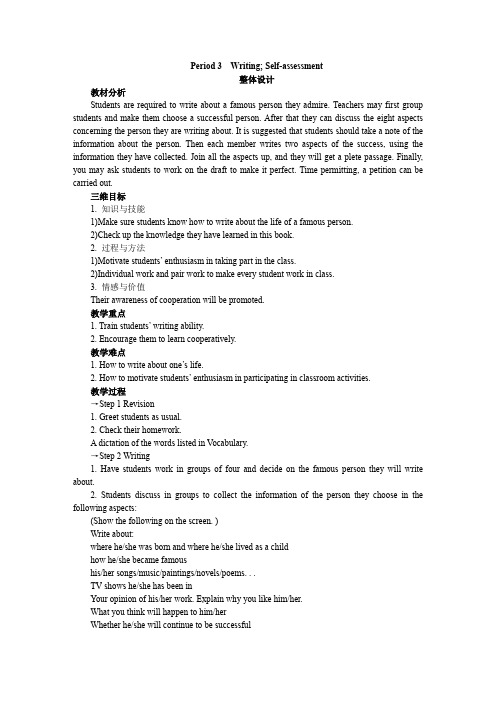
Period 3Writing; Self-assessment整体设计教材分析Students are required to write about a famous person they admire. Teachers may first group students and make them choose a successful person. After that they can discuss the eight aspects concerning the person they are writing about. It is suggested that students should take a note of the information about the person. Then each member writes two aspects of the success, using the information they have collected. Join all the aspects up, and they will get a plete passage. Finally, you may ask students to work on the draft to make it perfect. Time permitting, a petition can be carried out.三维目标1. 知识与技能1)Make sure students know how to write about the life of a famous person.2)Check up the knowledge they have learned in this book.2. 过程与方法1)Motivate students’ enthusiasm in taking part in the class.2)Individual work and pair work to make every student work in class.3. 情感与价值Their awareness of cooperation will be promoted.教学重点1. Train students’ writing ability.2. Encourage them to learn cooperatively.教学难点1. How to write about one’s life.2. How to motivate students’ enthusiasm in participating in classroom activities.教学过程→Step 1 Revision1. Greet students as usual.2. Check their homework.A dictation of the words listed in V ocabulary.→Step 2 Writing1. Have students work in groups of four and decide on the famous person they will write about.2. Students discuss in groups to collect the information of the person they choose in the following aspects:(Show the following on the screen. )Write about:where he/she was born and where he/she lived as a childhow he/she became famoushis/her songs/music/paintings/novels/poems. . .TV shows he/she has been inYour opinion of his/her work. Explain why you like him/her.What you think will happen to him/herWhether he/she will continue to be successfulThey can design as many questions as possible so that they may get as much information. A student from each group will be chosen to take a note of the results of discussion. The following questions can be used.1)Where and when was he/she born?2)How much do you know about his/her family/childhood?3)How did he/she bee famous?4)What do you think of him/her?5)How do you like his/her songs/poems?6)What do you think will happen to him/her?7)Will he/she continue famous in the future?3. Each member of the group writes two aspects individually. Join all the aspects up, and the plete passage will be gained.4. The group work on the draft to perfect it before it is presented to the rest of the class.(Show a sample version on the screen. )Mark TwainMark Twain(1835-1910), one of the best known American writers in the 19th century, was born in Missouri in the middle part of the United States.Mark Twain’s hometown lay on the banks of the Mississippi River, where he spent his childhood. When he grew up, he worked as a pilot on a river boat for some time. Mark Twain is not his real name, but his pen name. He took it from the shout of the sailors’ measuring the depth of the water when the water was two marks deep on the lead line.In his whole life, he wrote a lot of novels, one of which is The Adventure of Tom Sawyer, the masterpiece which brought him fame and honor. Some of his writing have been translated into many languages. He and his works are deeply loved by readers throughout the world even now.→Step 3 Self-assessmentTo consolidate the knowledge they have revised in this module, you may ask them to do the following exercise:(Show the exercise on the screen. )1 They sang the same song over and over at the top of their_________ .A. noiseB. soundsC. voicesD. hands2 He slipped and broke his leg. _________ , he will have to be away from school for two or three months.A. BesidesB. As a resultC. What’s moreD. In fact3 This is the third time you_________ .A. are lateB. were lateC. have been lateD. had been late4 He was about to tell me the secret_________ someone patted him on the shoulder.A. asB. UntilC. whileD. when5 Nick is looking for another job because he feels that nothing he does_________ his boss.A. servesB. satisfiesC. promisesD. supports6 Their families are_________ marriage.A. connected toB. connectingC. connected toD. connected by7 _________ that a new project will be started in our town.A. It believesB. We are believedC. It is believedD. We believed8 By the time he was 38, he _________ principal of a university.A. will have beeB. had beeC. would have beeD. would bee9 In the Spring Festival children feel like_________ firecrackers very much.A. setting offB. setting outC. giving offD. giving out10 —Don’t forget to e to my birthday party tomorrow.—_________.A. I don’tB. I won’tC. I can’tD. I haven’tSuggested answers:1 C2 B3 C4 D5 B6 D7 C8 B9 A10 B→Step 4 Summary and HomeworkTeachers summarize the contents of this period. Through the study of this period not only are students able to know how to write one’s life, but also they can raise their awareness of cooperation by working on a draft in groups. The homework is to find someone to write about individually. They can find some information from the Internet or some other sources.板书设计Module 7RevisionPeriod 3Write about:where he/she was born and where he/she lived as a childhow he/she became famoushis/her songs/music/paintings/novels/poems. . .TV shows he/she has been inYour opinion of his/her work. Explain why you like him/her.What you think will happen to him/herWhether he/she will continue to be successful活动与探究Read your progress report to your parents and add more if possible. Then put it up on the wall to show it to the whole class.备课资料Writing tips英语的书面表达一直以来就是英语学习的瓶颈。
外研 高中英语必修4Module 2Writing(共15张PPT)
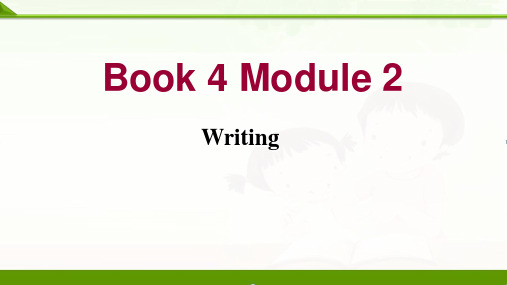
• Encourage people to take buses instead of cars
• Develop public transport • Improve road conditions • Build overpass or underpass
Read the passage on P18 and answer the questions.
roadwork ; route accident; pedestrian; overpass bridge; crowded; convenient(adj.) convenience(n.); inconvenient inconvenience; rush hour ;
public transport; no entry;
Book 4 Module 2
Writing
List reasons and solutions
•Bad weather •Parking cars everywhere •Traffic accident •Bad road condition •Little public transport
3. How many solutions does the writer find? Two (close the city center to all traffic except buses and bikes; build car parks outside the town.)
4. Who are they in “They should close the city center”? The local government/ city council.
traffic jam,
最新高中英语新课标外研版必修4教案 Period3 Reading and SpeakingModule7 Revison.doc
Period 3 Reading and SpeakingThe General Idea of This PeriodThis period we will read a passage about robots.There are four activities in all.Activity 1 gives the students a chance to choose the words given to plete the passage,which is of help in deepening the understanding of the whole passage.And if they can’t make sense of the passage pletely,some explanation is needed.In Activity 2 the students are encouraged to work with their partners asking and answering questions and at the same time write the key words to retell the passage.Activity 3 is designed like thisthe students are to tick the things they think robots will be able to do in one hundred years from now,which is helpful in developing their imagination.Activity may serve as a discussion within groups or between groups.It is an extension of Activity 3.Teaching Important PointsTrain the students’ reading abilities.Make sure the students make sense of the passage.Teaching Difficult PointsTrain the students’ reading abilities.Make the students know more about robots.Encourage the students to involve themselves in class actively.Teaching MethodsIndividual work and pair work to make every student work in class.Explanation to help the students make better sense of the text.Teaching AidsMultimedia,tape-recorder & a blackboardThree Dimensional Teaching AimsKnowledge and SkillsMake the students learn to use all kinds of methods such asskimming,scanning to understand the passage.Make sure the students make sense of the passage.Process and StrategiesMotivate the students’ enthusiasm in taking part in the class.Feelings and ValueThrough the learning of the passage about robots the students are sureto learn to understand the role robots play,and thus have a scientificopinion towards the development of the world.Teaching ProceduresStep 1 Fast readingTPlease look at the picture.What do you think they are.I guess they are toy dogs.S1SMaybe they are racing toy dogs.They may be programmed to run faster 2than ordinary dogs.TI’m not so sure about it,but one point is certainthese are “robots”designed by human beings for some purposes.This is the very topic oftoday.First you may read the passage and put these phrases in the correctplaces.(Show the following on the screen.)a.are usedb.were usedc.are being designedd.were designede.has been programmedf.was inventedg.will be run by “smart robots”h.robots may be so advancedi.unlikelyj.robots which walk(The teacher may give the students a few minutes to read the text and then call back their answers.)Suggested answers1.f2.d3.b4.a5.j6.g7.h8.c9.e 10.iStep 2 Intensive readingTGood job!Now you may read the text one more time and try to answer the questions in pairs.(Show the following on the screen.)1.Who invented the name “robot”?2.Who designed the first robot?3.Where were robots first used?4.Why do robots which walk have lots of legs?5.What kind of robot is “smart”?6.What was Elma designed to do?7.What did Isaac Azimov say about robots and humans?8.Do you think the writer agrees with him?Suggested answers1.Karel Capek (did).2.Two American engineers did.3.In general motors.4.So that they don’t fall over.5.Ones which can develop their own intelligence.6.To try different leg movements so that she doesn’t fall over.7.That it is unlikely that robots will ever harm humans.8.No,I don’t.TWell done!Take down the key words of the answers to the questions and you will get the main idea of the passage.You may use the key words to retell the whole passage.(Give the students some time to prepare and then encourage them to retell.A few good ones may be asked to retell.)Step 3 DiscussionTYou did very good jobs!As we all know,once designed,the robots can do many jobs for us.Now work in pairs.Tick the things you think robots will be able to do in one hundred years from now.You may add some more things to the list.(Write the following on the blackboard.)1.walk on two legs 5.play tennis2.speak 6.play the violin3.cook 7.put on your clothes for you4.help with homework 8.have feelings(After a few minutes’ discussion the students may be encouraged to work with another pair and discuss their ideas about the robot of the future.)Step 4 Summary and homeworkTThis period we read a passage about robots.From the passage we have known the origin of robots.Besides,we have known that robots can make our lives easier,but they may also cause new problems.So as human beings,weshould put their advantages to good use and at the same time prevent the possible problems they may cause for our world.After class please draw a robot you can imagine and introduce to your classmates what your ideal robot can do.After that you may write a passage with the title My Dream Robot.So much for today.Good-bye,everyone!SsGood-bye,teacher!The Design of the Writing on the BlackboardModule 7 RevisionThe third period1.walk on two legs 5.play tennis2.speak 6.play the violin3.cook 7.put on your clothes for you4.help with homework 8.have feelingsRecord after Teaching_________________________________________________________________ ___________________________________________________________________ ___________________________________________________________________ __Activities and Research1.Try to write a short passage with the title “My Dream Robot”.2.Draw your ideal robot.Reference for TeachingLanguage Points1.Nowadays,robots are used for many purposes,ranging from building machines in factories to the exploration of Mars.现今,机器人的用途很多,从用来制造工厂的机器到探索火星都可以用到它们。
- 1、下载文档前请自行甄别文档内容的完整性,平台不提供额外的编辑、内容补充、找答案等附加服务。
- 2、"仅部分预览"的文档,不可在线预览部分如存在完整性等问题,可反馈申请退款(可完整预览的文档不适用该条件!)。
- 3、如文档侵犯您的权益,请联系客服反馈,我们会尽快为您处理(人工客服工作时间:9:00-18:30)。
Period 2 Vocabulary;Writing The General Idea of This Period We learned a large number of new words in the last modules.To consolidate the words we have learned,a few activities are designed.The teacher may ask the students to finish them individually and then call back their answers in a whole class setting.If the class is good enough and meanwhile,the teaching time is enough,a brainstorm is suggested.Take Activity 3 as an example,the teacher may say,”Please give as many words as possible related with transportation.”Or you can generalize other new words they have learned in the last module such as “body language” “science”. In Writing,the students are encouraged to write a leaflet giving advice for visitors who have a few days to spend in their town.The teacher may first encourage the students work in groups of four and discuss the topics given by the teacher and then each member will be asked to write the advice for one topic according to the expressions given.At last,individuals introduce their writing to their group members within groups and e up with a leaflet.Time permitting,all the leaflets are collected to make a column. Teaching Important Points Ecourage the students to speak actively in class. Train the students’ writing skills. Help the students to revise the words they have learned. Teaching Difficult Points How to help the students improve their writing ability. How to make them master as many new words as possible. Teaching Methods Individual work or pair work to make the students participate in class. Explanation to make the students make a deeper sense of the knowledge they have learned. Encourage the students to practice writing by following instructions. Teaching Aids A blackboard A multimedia Three Dimensional Teaching Aims Knowledge and Skills Train the students’ writing ability. Help the students master more new words. Process and Strategies Practice writing Encourage the students to master new words by relating new knowledge with old knowledge. Feelings and Value By learning to write a leaflet revise how to give advice to others. Teaching Procedures Step 1 plete the sentences T:We have learned some new words in the past modules.Now let’s do some exercises to consolidate them. (Show the following on the screen.) plete the sentences. 1.The two men hid in a c until the danger was over. 2.The Himalayas are over there—you can just see the p in the distance. 3.The children ran down the s towards the road. 4.Wheat is grown in the p of Central North America. 5.Don’t walk too near the edge of the c .You might fall off!
Suggested answers: 1.cave 2.peaks 3.slope 4.plain 5.cliff plete the sentences with the correct form of verbs in the box. Raise shake smile stare wave wipe 1.He __________his head to say no. 2.She __________to agree. 3.The two friends __________good-bye as they left. 4.You should __________your arm to get the teacher’s attention. 5.Please __________your feet before ing in. 6.Why are you __________at me?Have I done anything wrong?
Suggested answers: 1.shook 2.smiled 3.waved 4.raise 5.wipe 6.staring Think about transport in town.Say what these things are. 1.a railway system under the ground__________ 2.the busiest time of the day in the streets__________ 3.a road that goes round a town__________ 4.a one-way ticket__________ 5.the cost of a ticket__________ 6.If they’re red,you have to stop.__________
1.underground 2.rush hour 3.ring road 4.single 5.fare 6.traffic lights
Step 2 Writing T:So much for the vocabulary.Now let’s e to writing.We have learned how to give advice to others.This class you may write a leaflet giving advice for visitors who have a few days to spend in your town.Please follow the instructions. (The teacher group the students in groups of three or four and encourage the students to discuss the following topics,using the notes to give them ideas.) (Show the following on the screen.) Place to visit Monuments,museums,parks,places of natural beauty near the town... Practical information Somewhere to stay,a good place to eat,some dos and don’ts for foreigners Transport The best way to get around,the cheapest way,the most fortable way,the best moment of the day to travel...
T:Now you may divide the work between group members.Each member can write the advice for one topic.Here are some expressions you can use. You should/shouldn’t... You mustn’t miss... If you have time... Why don’t you...? Make sure to... Example: You mustn’t miss the museum of science.It’s one of the best in the country. If you have time,you should also visit...
